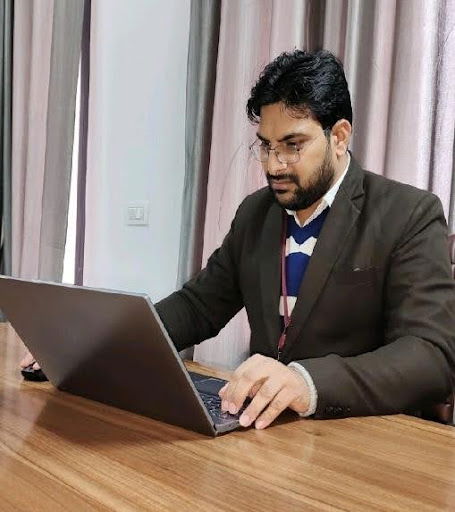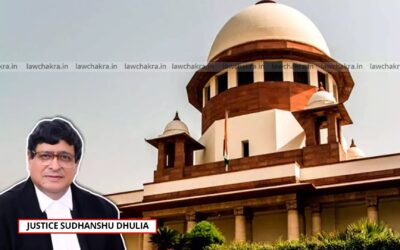Prof. Dr. Hiranmaya Nanda, Professor at Maharishi Markandeshwar University on Current Trends in Legal Education

Interview conducted by Achal Bhandari as a part of his Campus Leaders Program.
Dr. Prof. (Dr.) Gaurav Jangra is an academician, professor, researcher with over 12 years of experience in teaching and research, specialising in finance and digital marketing. A dual JRF (Management and Commerce) & Ph.D.
Dr. Gaurav Jangra is a multifaceted academic, researcher, and entrepreneur with over a decade of experience in both teaching and business.
Previously, he was working as an Associate Professor, Management, Chandigarh University. His professional journey is marked by a commitment to education, innovation, and technological advancement, reflected in his contributions to academia and the business world.
Started a new position as Professor of Management at Maharishi Markandeshwar (Deemed to be University).
What inspired you to pursue a career in law?
From a young age, I was always drawn to issues of justice, fairness, and advocacy. Growing up, I admired individuals who used their knowledge of the law to protect rights, challenge injustice, and bring about meaningful change in society. The idea that one could use legal reasoning to solve complex problems and make a tangible difference in people’s lives was deeply motivating.
Can you share some memorable experiences from your law school days?
Law school was both intense and enriching. I vividly remember my first moot court competition—it was nerve-wracking but incredibly rewarding. Preparing arguments, anticipating counterpoints, and presenting before a panel taught me how to think on my feet.
Another memorable experience was working on legal aid clinics, where I had the opportunity to provide guidance to underprivileged individuals. It reinforced the social responsibility that comes with a legal education.
What are some of the key milestones in your career?
Some major milestones include securing my first position at a reputed law firm, handling my first independent case, and later transitioning into academia and mentoring future legal professionals.
Publishing research papers in recognized journals and being invited to speak at legal conferences were also significant achievements that shaped my professional identity.
What achievements are you most proud of?
I am particularly proud of mentoring students who have gone on to succeed in prestigious positions in the judiciary and corporate sector. Additionally, contributing to policy recommendations and working on public interest litigation cases that impacted broader communities are accomplishments I hold dear.
What major challenges have you faced in your career, and how did you overcome them?
One of the greatest challenges was balancing the theoretical aspects of law with its practical applications in the early stages of my career. There were moments of self-doubt, especially when handling complex cases or tight deadlines.
However, persistence, seeking guidance from seniors, and continuous learning helped me overcome these hurdles. Resilience and adaptability became crucial tools in my professional toolkit.
How do you handle stress and maintain a work-life balance?
Stress management comes down to time management and setting boundaries. I prioritize my tasks, delegate when necessary, and ensure I make time for hobbies and family. I also practice mindfulness and stay physically active, which helps in maintaining mental clarity. Work-life balance doesn’t mean equal hours but rather ensuring that neither sphere is neglected.
What are the current trends in the legal field that law students should be aware of?
The integration of technology in law is a major trend. Legal tech, AI-driven research tools, e-courts, and digital contracts are reshaping how legal work is done. Additionally, areas like cyber law, data privacy, environmental law, and intellectual property rights are rapidly growing. Students should also be aware of globalization’s impact on cross-border legal issues.
How do you see the field of law evolving in the next decade?
The next decade will see a greater fusion of law and technology. Virtual hearings, AI in case analysis, and digital law libraries will become the norm.
We’ll also see more emphasis on interdisciplinary knowledge—law professionals will need to understand technology, business, and even psychology. Moreover, client expectations will shift towards more transparent, accessible, and cost-effective legal services.
What advice would you give to law students who are about to graduate?
Be open to learning and embrace both victories and setbacks. Choose your specialization not just based on market trends, but also your personal strengths and interests. Intern as much as possible to gain real-world exposure. Networking and mentorship can open many doors, so invest in relationships.
How can students make the most of their time in law school?
Actively participate in moot courts, debates, legal writing, and internships. Don’t just focus on academics—build skills like critical thinking, communication, and negotiation. Stay updated with current affairs and legal developments. Lastly find a mentor who can guide you through the challenges of law school and beyond.
Disclaimer: Interviews published on Lawctopus are not edited thoroughly so as to retain the voice of the interviewee.
This interview is a part of our Star Interview series, conducted by the Campus Leaders at Lawctopus. Stay tuned for more!

